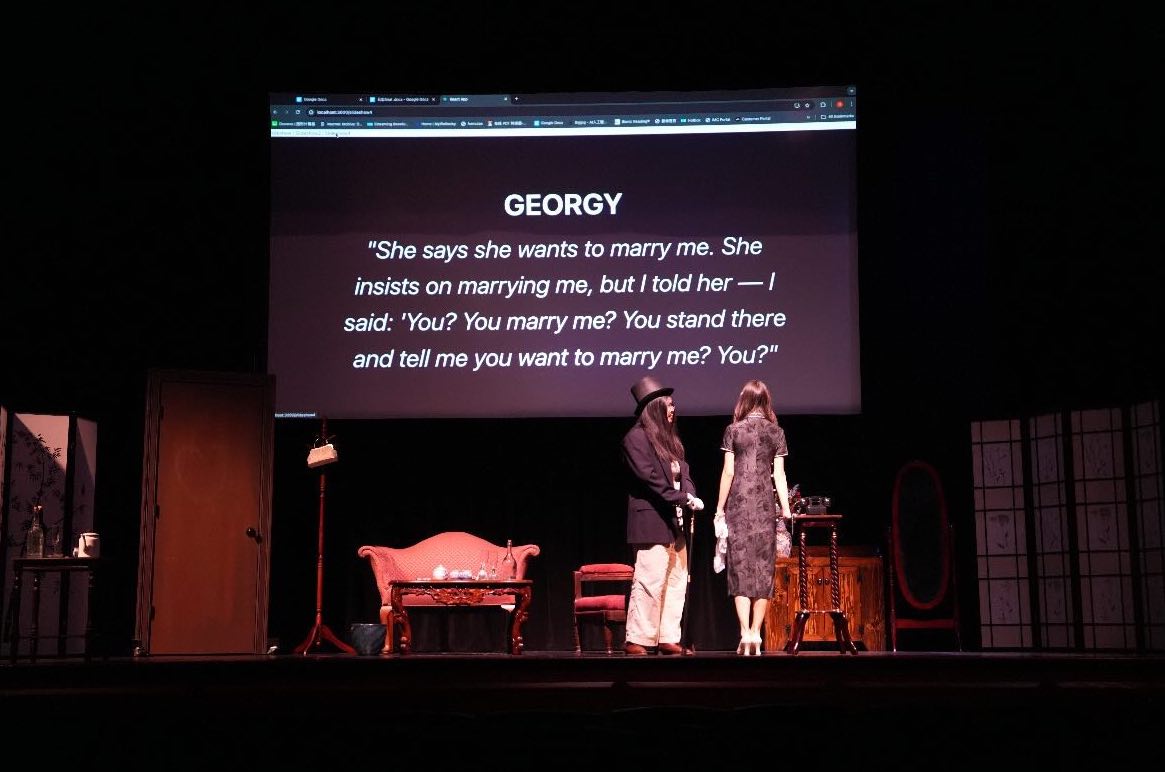On Friday, Oct. 18, the cast and crew behind “Sunrise” (“日出”), Wellesley College Upstage’s first theatrical production of the semester, made Wellesley history. “Sunrise” is the first theater production in a language other than English to be staged by students at Wellesley College and, as those seated for the performances will surely attest, it was a triumph.
The play, which Upstage performed in Mandarin with English subtitles, had three showings, with the opening night on Friday followed by two shows on Saturday. After the Saturday matinée, Professor Mingwei Song of Wellesley’s Department of East Asian Languages and Cultures gave a talk on the play’s context in mid-20th century China and its author, Cao Yu, whom Yihan Ling ’27, the director of Upstage’s production of the play, calls “China’s Shakespeare.”
“Sunrise” was written and first performed in 1936, and is the second installment in Yu’s classic trilogy of Huaju (“spoken drama”). It follows Chen Bailu (Grace Yuan ’28), an educated young woman from the country who, after her family suffers a blow to their status, moves to the city and becomes a prostitute. Living in a hotel managed by her wealthy clients, she indulges in parties and entertainment, unbothered by the city’s debauchery. But when an abused young girl shows up on her doorstep, Chen Bailu is forced to face the suffering around her and reexamine the life she is leading.
Ling and Eliza Mai ’27, who both co-chair Upstage, knew they wanted to stage a play by Cao Yu due to his iconic legacy in Chinese theater. Before Cao Yu’s works, Peking Opera –– a form of opera which involves music, dance, martial arts and acrobatics –– was the dominant form of theatrical entertainment. It was Yu who first popularized the spoken drama in China, and changed the way audiences viewed drama.
Initially, Upstage considered staging “Thunderstorm,” the first drama in Yu’s trilogy and perhaps his most famous work. However, because they were driven by an interest in class issues, the team decided to go with “Sunrise” instead. “Thunderstorm” focuses on one family, all of the same social class, while “Sunrise” follows the lives and interactions of several different characters from all kinds of class backgrounds. It was important for Ling and Mai to explore a range of class struggles and how these struggles relate to other global issues, such as patriarchy and poverty.
For Ling, “Sunrise” still feels strikingly relevant today. Although the play was written almost a hundred years ago, she says, “things haven’t changed … That’s what made me want to put on this show. After one hundred years, you can see that people in the lower classes, they’re still being exploited.” Ling felt that the questions that the play explores are ones of interest to Wellesley students, and as a result, it was clear that “Sunrise” was the perfect choice for the production this fall.
Ling and Mai had wanted to put on a play in Mandarin at Wellesley for a while. They were inspired to make their dream into a reality after seeing “Rhinoceros in Love,” a Mandarin-language play staged by Massachusetts Institute of Technology’s Wuming Theater Club last April. According to Ling, there are Wellesley students who are interested in participating in theater in their native language of Mandarin — they just choose to go to MIT or other nearby schools to get involved, because Wellesley does not have a history of supporting theater in languages other than English. Nevertheless, it was precisely because of the lack of multilingual theater at Wellesley that Ling and Mai were determined to stage “Sunrise” as soon as possible.
“There definitely are students who are interested in putting on Mandarin plays at Wellesley,” Ling said. “So we thought, why can’t we do it here?”
As an actor whose native language is Mandarin and who has been involved in multiple plays at Wellesley, Ling is incredibly proud to have been a part of the college’s first non-English language theater production. “When you’re doing theater that’s not in your native language, it can be a bit weird sometimes,” she said. “For the [bilingual students] here, I want to tell them that there’s a chance for you to make theater in your native language. English is not the only language for theater.”
Contact the editors responsible for this story: Anabelle Meyers, Ivy Buck




